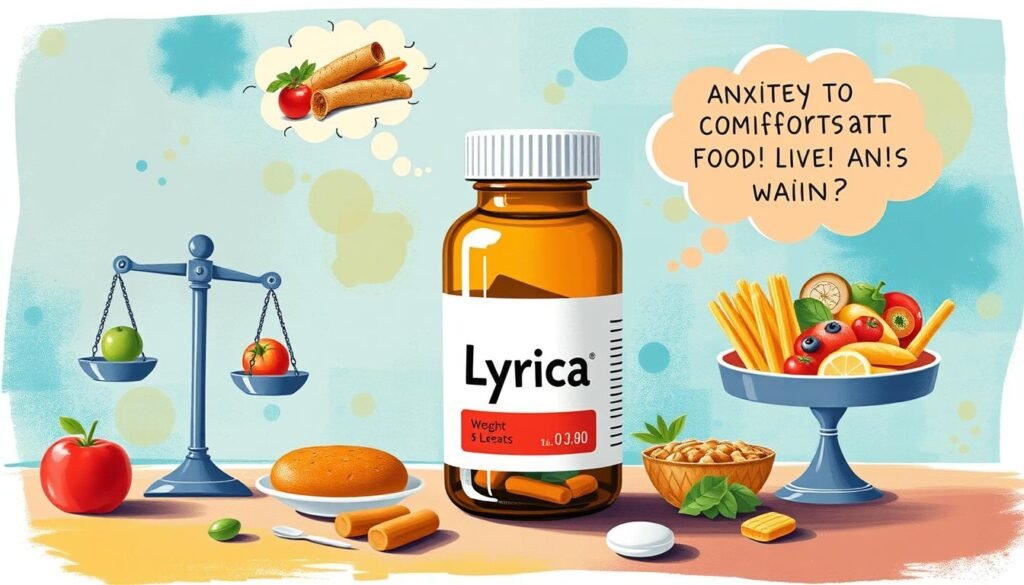Nearly seven million Americans live with Generalized Anxiety Disorder (GAD). Many treatments don’t help 40 to 60 percent of patients, even after six months. This fact points to a pressing need for better solutions, including Lyrica for anxiety. Known medically as pregabalin, Lyrica has shown promise in easing symptoms where other approaches have failed. In studies, adding Lyrica to usual medication helped patients experience much less anxiety. This article will discuss how Lyrica helps, its effectiveness, and what to know about side effects.
Key Takeaways
- Approximately 7 million people in the U.S. have Generalized Anxiety Disorder (GAD).
- Standard treatments leave up to 60% of patients without remission.
- Lyrica has shown effectiveness in reducing anxiety scores in clinical trials.
- 50% of patients on Lyrica as add-on therapy experienced at least a 50% reduction in anxiety symptoms.
- Common pregabalin side effects include dizziness, headache, and somnolence.
- Understanding the balance between treatment benefits and side effects is essential for effective anxiety management.
Understanding Anxiety Disorders
Anxiety disorders include many mental health issues that affect daily living. Generalized Anxiety Disorder (GAD) is especially notable. It is known for constant worry about many life areas. This worry leads to physical issues like muscle tension and fatigue. Such issues create a cycle that makes daily tasks hard.
What is Generalized Anxiety Disorder (GAD)?
People with Generalized Anxiety Disorder face ongoing anxiety and worry. It’s hard for them to control. Symptoms include feeling restless, getting tired easily, being irritable, and trouble focusing. Millions in the U.S. suffer from GAD. Managing it is key to better life quality.
Prevalence and Impact of Anxiety Disorders
Nearly 19% of people in the U.S. deal with an anxiety disorder. About seven million adults have GAD. It’s a big issue for mental health experts. Anxiety affects both mind and body. It leads to higher health care costs and less productivity. It shows why finding effective treatments is vital.
| Type of Anxiety Disorder | Prevalence | Common Symptoms |
|---|---|---|
| Generalized Anxiety Disorder (GAD) | 7 million adults | Excessive worry, fatigue, muscle tension |
| Obsessive-Compulsive Disorder (OCD) | 2.2 million adults | Recurrent obsessions, compulsive behavior |
| Panic Disorder | 6 million adults | Panic attacks, heart palpitations |
| Post-Traumatic Stress Disorder (PTSD) | 7-8 million adults | Flashbacks, severe anxiety |
| Social Anxiety Disorder (SAD) | 15 million adults | Fear of social situations, avoidance behavior |
We need a detailed plan to treat anxiety disorders. It should include both drugs and therapy. Making these treatments easy to get can better help those in need.
Overview of Lyrica (Pregabalin)
Lyrica is the brand name for pregabalin, a medication used mainly as an anticonvulsant. It is also known for its use in treating anxiety. Both doctors and patients looking for anxiety solutions find Lyrica interesting because of its wide uses.
What is Lyrica?
Lyrica has gotten approval from the FDA for treating various conditions such as:
- Fibromyalgia
- Neuropathic pain from diabetic peripheral neuropathy
- Postherpetic neuralgia
- Seizures in both adults and children older than one month
- Nerve pain due to spinal cord injuries
Lyrica’s use spans more than just dealing with nerve pain and seizures. It comes in capsules and liquid, with doses ranging from 25 mg to 300 mg for the former and 20 mg/mL for the latter.
Significant Uses of Lyrica
Even though Lyrica isn’t officially approved for treating Generalized Anxiety Disorder (GAD) in the U.S., many doctors prescribe it for this reason. Lyrica works by changing how neurotransmitters in the brain release, helping to ease anxiety symptoms. It is prescribed in doses from 150 mg to 600 mg daily.
Lyrica is considered a Schedule V controlled substance, indicating a risk for dependence. Patients looking into treating anxiety may find Lyrica an interesting option given its various uses. This discussion about Lyrica’s effectiveness for anxiety continues to evolve.
Lyrica for Anxiety: Treatment Benefits
Lyrica, known as pregabalin, is a key treatment for anxiety disorders, especially generalized anxiety disorder (GAD). It is approved by the FDA for adults with GAD. It offers benefits for people who don’t get better with traditional treatments. Studies show Lyrica quickly eases anxiety symptoms, helping patients find relief swiftly.
Efficacy in Generalized Anxiety Disorder
Research shows Lyrica can greatly ease anxiety symptoms as an additional therapy. About half of the people in one study saw their GAD symptoms drop a lot. This proves its ability to bring relief from this challenging disorder.
Patients often feel better within a few weeks of starting Lyrica. This improvement in anxiety and general wellness is significant for them.
Comparative Advantages of Lyrica
The benefits of Lyrica stand out. Compared to traditional medications, it works faster, often in 1-2 weeks for anxiety. It also tends to be easier on the body. People report fewer side effects like dizziness and less weight gain, improving treatment.
| Feature | Lyrica | Traditional Anti-Anxiety Medications |
|---|---|---|
| Efficacy | Significant improvement in symptoms for 50% of users | Variable; often requires longer treatment times |
| Onset of Action | 1-2 weeks for anxiety relief | 4-6 weeks typically |
| Tolerability | Generally well-tolerated, mild side effects | Possible severe side effects and dependency risks |
| Schedule Classification | Schedule V controlled substance | Varies by medication; often higher classifications |
Lyrica offers big benefits for treating anxiety. But, it’s critical to talk with healthcare providers to see if it’s right for you. For more info on this medicine and its benefits, keeping up with medical advice is key. Check out this link for a deeper look into treatment benefits.
Pharmacological Mechanism of Lyrica
Lyrica is mainly used for nerve pain and fibromyalgia. It has an interesting pharmacological mechanism for easing anxiety. Unlike other drugs that target GABA, Lyrica follows a different path.
How Lyrica Works in the Brain
Lyrica attaches to a specific part in nerve cells that controls calcium entry. This action cuts down on the calcium entering these cells. Less calcium means fewer signals that cause excitement in the brain, which helps calm anxiety. Lyrica works quickly, reaching high levels in the blood within an hour, offering fast relief for anxiety.
Relation to GABA and Neurotransmitter Release
Although Lyrica looks like GABA, it doesn’t work the same way. This difference highlights how Lyrica is unique compared to standard anxiety drugs. It helps lower the release of certain brain chemicals that can cause anxiety. This method means Lyrica can help with anxiety without working like traditional drugs. Those looking for natural ways to ease anxiety can find more information at moodcarehealth.

Pregabalin Side Effects
It’s crucial to know about pregabalin side effects if you’re thinking about Lyrica for anxiety treatment. While it helps many, there are side effects to watch for. Knowing them helps manage risks well.
Commonly Reported Side Effects
Pregabalin, also known as Lyrica, has various side effects. Some common ones are:
- Dizziness
- Drowsiness
- Dry mouth
- Weight gain
People often talk about weight gain with Lyrica. This is a concern for some patients. Serious side effects like suicidal thoughts and bad allergic reactions need quick doctor visits. Muscle pain and breathing issues are also important to watch for. They show why it’s key to keep an eye on your health with this medication.
Potential Risks and Management
Managing pregabalin side effects is key. Watch for changes in how you feel, mentally and physically. Watching out for dizziness and sleepiness helps keep your daily life safe.
Weight gain is something to watch if you’re using pregabalin. If you’re worried about weight, talk to your doctor for advice. It’s also crucial to report serious side effects like blurry vision, trouble breathing, or low platelet counts right away.
| Common Side Effects | Serious Side Effects |
|---|---|
| Dizziness | Suicidal Thoughts |
| Drowsiness | Severe Allergic Reactions |
| Dry Mouth | Breathing Problems |
| Weight Gain | Unexplained Muscle Pain |
Applications in Off-Label Uses of Lyrica
Lyrica, also known as pregabalin, is getting a lot of attention for its off-label uses. It’s officially approved for neuropathic pain and seizures. But now, it’s also being used to treat anxiety disorders. Many healthcare providers are using pregabalin for this, even without FDA approval in the U.S.
Use Beyond Approved Indications
Studies on pregabalin have shown good results in psychiatric uses. It’s commonly prescribed off-label for anxiety, especially for those with generalized anxiety disorder (GAD). A review including 55 double-blind trials and 15 open studies proves pregabalin can reduce anxiety better than a placebo. This has made it more popular for mental health treatments.
Clinical Studies Supporting Off-Label Usage
There’s growing evidence for Lyrica’s off-label use in anxiety. One key finding is its effectiveness in lowering preoperative anxiety, with a significant impact. Studies consistently found it better than placebo for treating anxiety. Despite some safety concerns, its moderate effectiveness supports its use in anxiety treatments.

| Study Type | Pregabalin Efficacy | Gabapentin Efficacy |
|---|---|---|
| Double-blind RCTs | SMD of -0.55 (Pregabalin) | SMD of -0.92 (Gabapentin) |
| Open-label Studies | Inconclusive Results | Limited Evidence |
| Overall Efficacy | Moderate evidence in anxiety | Widely prescribed for psychiatric disorders |
While there are worries about misuse and side effects, Lyrica is now a common choice for treating anxiety. Its extensive off-label use emphasizes the importance of more research. This will confirm how well it works for anxiety.
Lyrica Dosage Guidelines
Lyrica is known as pregabalin. It’s used for anxiety and other health issues. It’s key to follow the lyrica dosage guidelines to find the right dose for anxiety. This part talks about common doses and the need to adjust them for each person.
Typical Dosage for Anxiety Management
For adults, the usual Lyrica dose starts between 150 mg and 600 mg daily. Starting with 150 mg is common for anxiety treatment. Changes can be made to better help the patient. Here’s a quick look at doses for different conditions:
| Condition | Starting Dosage | Maximum Dosage |
|---|---|---|
| Diabetic Peripheral Neuropathy | 150 mg/day | 300 mg/day |
| Nerve Pain from Shingles | 150 mg/day | 600 mg/day |
| Fibromyalgia | 150 mg/day | 450 mg/day |
| Partial-Onset Seizures | 150 mg/day | 600 mg/day |
Adjustments Based on Individual Needs
Adjusting the dose of Lyrica for anxiety is important. Patients differ in how they respond and what side effects they have. Also, things like kidney health must be considered. The decision to adjust the dose can depend on:
- Patient’s age
- Body weight
- Concurrent medications that may interact
- Presence of side effects
Doctors recommend watching patients closely when the dose changes. This ensures the treatment is safe and works well. Talk openly with your doctor about any bad effects or if your symptoms aren’t improving. This helps in adjusting the treatment quickly.
Lyrica and Weight Gain
Using Lyrica may lead to lyrica and weight gain for some people. About 10% of those on this medication see a slight to moderate weight increase. This seems more common with higher doses. Knowing about this side effect is key for anyone on Lyrica.
Connection Between Lyrica and Weight Changes
Lyrica can make you gain weight by increasing your appetite and slowing your metabolism. On average, people might gain about 3.6 lbs within 12 to 18 months. For those on a higher dose, it could go up to 6.5 lbs. Diabetics on Lyrica have seen a weight rise of about 11.4 lbs over two years. Feeling hungrier and more tired are some reasons for this weight challenge.
Advice for Managing Weight While on Treatment
To handle managing weight changes with Lyrica, patients should try a few things. They should:
- Watch what they eat and aim for balanced meals.
- Stay active to help fight off weight gain.
- Talk to their doctors about changing the dose if weight gain is a big problem.
- Keep an eye on their weight to see if they need to change their lifestyle.
With these steps, people can deal with Lyrica’s weight challenges while staying healthy.

Lyrica Reviews and Patient Experiences
Lyrica is widely used for treating fibromyalgia and nerve pain. Since its FDA approval in 2007, over 9 million people have tried it. The lyrica reviews show a mix of results, from great success to difficult challenges.
Summary of User Feedback
Users of Lyrica share varied experiences. The most common complaint is dizziness, affecting about 30%. Sleepiness comes next, impacting 23% of patients. However, results vary, with some getting no relief for severe nerve pain despite higher doses. Problems like serious constipation, hearing issues, and other tough side effects have been reported.
Long-term Outcomes of Lyrica Usage
Looking at Lyrica’s long-term effects paints a mixed picture. Some see short-term benefits, but others face issues like macular degeneration and heart problems. Stopping Lyrica can be very hard, harder than stopping heroin for many. Yet, some manage to reduce their pain by slowly lowering their dose with a doctor’s help. This stresses the importance of careful long-term planning with Lyrica.
Lyrica Interactions with Other Medications
Lyrica helps with nerve pain and some seizures but can interact with other medicines. It’s very important to know about these lyrica interactions for your safety and to get the most from your treatment. Always talk to your doctor about everything you take to avoid bad reactions.
Common Drug Interactions
Lyrica can have issues when mixed with certain drugs, mainly because they can slow down the brain. Here’s a list of drugs that often cause problems:
- Opioids: Drugs like tramadol increase the chance of breathing problems when taken with Lyrica.
- Benzodiazepines: Using Lyrica with lorazepam or diazepam can make you very sleepy and uncoordinated.
- Sleep Aids: Sleep medicines can make the drowsiness worse if used with Lyrica, leading to extreme tiredness.
- Muscle Relaxers: Cyclobenzaprine and Lyrica together might cause a lot of sleepiness.
- Gabapentin: Gabapentin and Lyrica taken together can increase side effects from both.
Safety Considerations When Combining Treatments
Knowing about interactions helps keep you safe. For example, mixing Lyrica and alcohol can make you much more sedated, raising your accident risk. Herbal supplements like valerian root and Lyrica can also lead to too much sleepiness. It’s especially important to be careful with cannabis products, including CBD, because they can add to the sleepiness too.
With these common drug interactions in mind, always keep talking to your doctors. They can make a treatment plan that considers everything you’re using. Understanding the risks can help avoid bad effects.
| Medication Class | Potential Risks When Combined with Lyrica |
|---|---|
| Opioids | Increased risk of respiratory depression |
| Benzodiazepines | Greater drowsiness and risk of confusion |
| Sleep Aids | Severe sedation, impairment of daily activities |
| Muscle Relaxants | Excessive drowsiness and confusion |
| Herbal Supplements | Increased risk of side effects like sleepiness |
For more details on lyrica interactions, you might want to check out reputable sources like this article.
Conclusion
The summary of Lyrica for anxiety shows it could be a powerful treatment for Generalized Anxiety Disorder (GAD). Studies show it reduces symptoms more than a placebo. It works faster and has fewer withdrawal risks than other treatments. This makes it a good option for immediate mental health help.
But, choosing treatment means weighing good and bad points. Lyrica could have side effects and might not mix well with other drugs. It’s key for people to talk with doctors. Healthcare pros can tailor advice to fit each person’s health needs.
Preliminary data is hopeful, indicating Lyrica could enhance anxiety treatment tools. However, it’s vital to keep a close eye on its use. More research and feedback from patients will help. This will lead to better help for those fighting anxiety and related troubles, like insomnia. For more on Lyrica’s impact on anxiety, see this study.